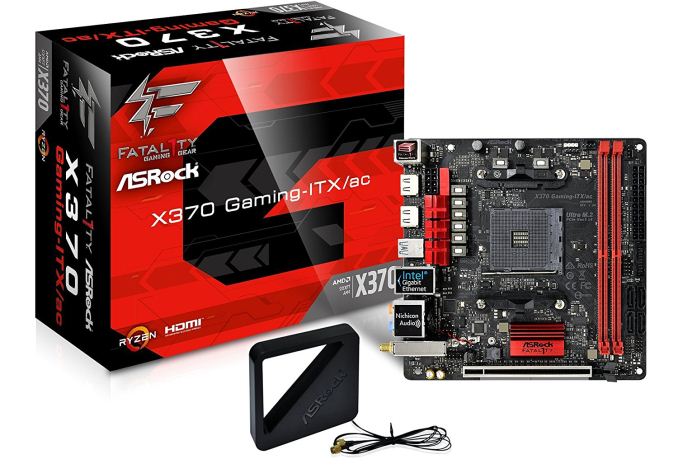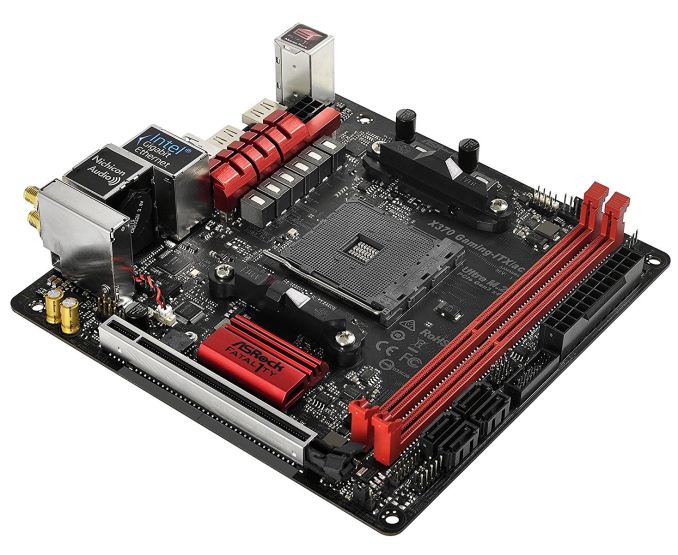The ASRock X370 Gaming-ITX/ac Motherboard Review
by Gavin Bonshor on April 18, 2018 8:00 AM EST- Posted in
- Motherboards
- Gaming
- AMD
- ASRock
- Mini ITX
- ITX
- AM4
- Ryzen
- X370
- X370 Gaming-ITX/ac
Conclusions
The ASRock X370 Gaming-ITX/ac is primarily aimed at gamers, but it has enough features and the components to take worthwhile considerations for enthusiasts looking to build a small form factor system to harness the power of the AMD Zen CPU architecture. All of AMDs current Ryzen AM4 socketed processors are compatible including the Ryzen 3/5 and 7 desktop ranges, as well as the latest addition to the SKU list with the Ryzen 3 2200G ($99) and Ryzen 5 2400G ($169) APUs.
For performance, the system came away with one obvious win so far in our AMD AM4 motherboard testing: POST time. The time from the system starting to the Windows screen loading was the lowest we have seen so far, and by several seconds. This shouldn't be attributed to the size or lack of controllers - other mini-ITX motherboards we have tested fell around the same time as the larger ATX boards, but the ASRock X370 Gaming-ITX/ac took a clear lead. The board also has good numbers for power and audio, but doesn't follow the other ASRock boards in having the best DPC latency (it still hits middle of the pack). General CPU and GPU performance were also middle of the pack for the most part, eeking out wins in video encoding but falling slightly behind in Total War, but not by much. It still hit our 3.9 GHz metric on the Ryzen 7 1700 when overclocked.
For a miniITX motherboard, the ASRock X370 Gaming-ITX/ac has a very formidable power delivery for its size. For overclockers who care about making minor tweaks and adjustments, the Gaming-ITX/ac doesn’t come with an external clock generator, making base clock overclocking moot. The power delivery heat sinks in testing did get a little warm to the touch, but nothing that would indicate the board and power delivery couldn’t handle with our 8-core Ryzen 7 1700 ($299) processor bellowing out workloads.
Pulling it back onto the X370 Gaming-ITX/ac itself, the board itself does have a good variety of USB connectivity, a high-end Realtek ALC1220 codec, and Intel-based networking, both wired and wireless. ASRocks decision to add two HDMI 1.4b outputs with the aim in supporting AMDs APU options is a little questionable considering how much rear panel space the connections take up side by side.
While the main advantage of X370 over the B350 chipset is in regards to multi-graphics card setups, specifically SLI support, including the more expensive X370 chipset on a board not physically capable seems a little bit of a waste. In fact, the B350 version of this board is surprising identical in looks and specifications, except the Wi-Fi module on the X370 Gaming-ITX/ac which features 2T2R technology. It is also worth mentioning that the B350 version is around $35 cheaper which does make it seem like a bargain in retrospect, especially with a user planning on using a system featuring this board over a wired LAN.
While performance is consistent and in-line with other models on test, the ASRock X370 Gaming-ITX/ac provides good value mixed with some very interesting inclusions such as dual HDMI 1.4b for APU users. For the performance aficionados, overclocking performance is very good for a miniITX offering and for those planning on building a powerful small form factor system with one of the Ryzen 3, 5 and 7 range, it wouldn’t be a bad choice. If you’re looking for something a little more wallet friendly, the ASRock AB350 Gaming-ITX/ac which is essentially the same board with a lower grade Wi-Fi module but at a lower price, seems the better option.
Motherboards Tested
- $260 - ASRock X370 Professional Gaming
- $255 - MSI X370 XPower Gaming Titanium [review]
- $230 - ASRock X370 Taichi
- $175 - GIGABYTE AX370-Gaming 5 [review]
- $160 - ASRock X370 Gaming-ITX/ac [this review]
- $110 - Biostar X370GTN [review]
- $98 - MSI B350 Tomahawk [review]
- $90 - ASRock B350 Gaming K4 [review]
For those waiting on X470 reviews, we have one or two waiting in the wings. Stay tuned!












30 Comments
View All Comments
5080 - Wednesday, April 18, 2018 - link
If have built a few systems using this board and the B350, but was never able to get a Bristol Ridge APU to work. I followed the approved memory list from ASRock without success. I Always ended up using a Ryzen CPU and Cheap GPU or since March Raven Ridge. It would be interesting if anyone else got this to work with a Bristol Ridge APU?gavbon - Wednesday, April 18, 2018 - link
If I had a Bristol Ridge APU to hand, I would have tried for you! I have used a Ryzen 3 2200G though and it worked fine :)5080 - Thursday, April 19, 2018 - link
Yes, I just finished building a system for a friend with this board and Ryzen 5 2400G. It works great, but Bristol Ridge is still a no go even with the latest BIOS 4.50.Geranium - Wednesday, April 18, 2018 - link
Gavin, are you sure this board has USB 3.1? Cause Asrock's website has no mention of USB 3.1.http://www.asrock.com/mb/AMD/Fatal1ty%20X370%20Gam...
SuperiorSpecimen - Wednesday, April 18, 2018 - link
3rd bullet point from the bottom of the first list.jtd871 - Wednesday, April 18, 2018 - link
I only see 1 19-pin USB3 header on the mobo top.jtd871 - Wednesday, April 18, 2018 - link
ASRock manual sez that header supports up to two ports.gavbon - Wednesday, April 18, 2018 - link
I have the board in my hands now (you had me second guessing myself) and I can confirm there is a USB 3.1 Gen1 header and a USB 2.0 header; each of them gives an additional two ports.gavbon - Wednesday, April 18, 2018 - link
I think the confusion is where it says 2 x header (it means 2 ports from a header, not 2 headers etc) - Maybe I should make it clearer in the future!gavbon - Wednesday, April 18, 2018 - link
Yeah was a total brain fart on the USB 3.1 Gen2, for some reasons it's been ingrained in my brain from lack of sleep and X470! - I blame the lack of Kenco in my cupboard! - Edited now, they are USB 3.0 (Type-C included)